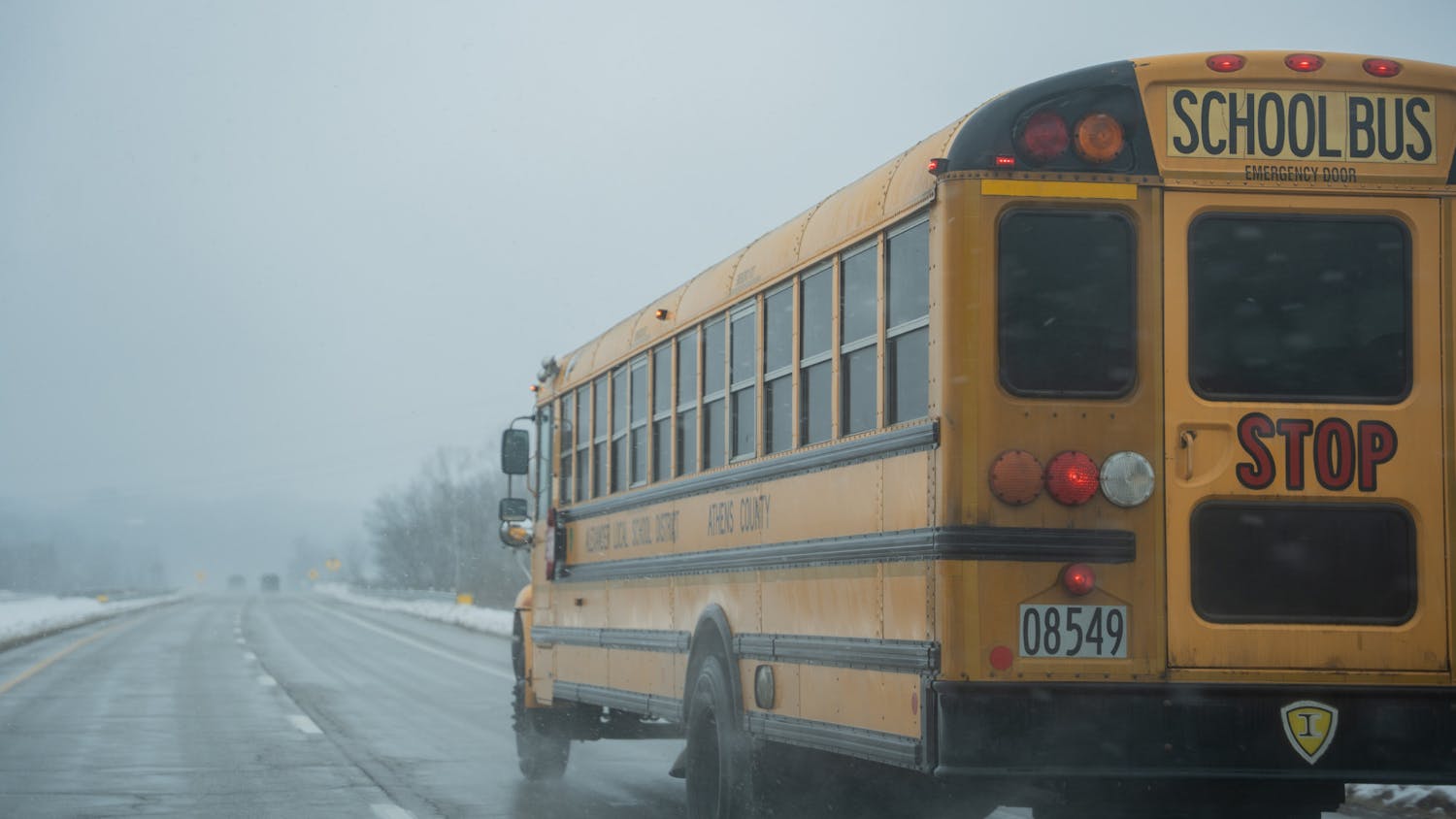More than 80 people attended the event hosted by the Ohio University Student Union, including members of student groups BLAC, Sierra Student Coalition, OU's NAACP chapter and Bobcats for Bernie Sanders.
Ohio University students joined campuses nationwide Thursday as part of the Million Student March, where students came together for the Rally for Campus Democracy.
More than 80 people attended the event hosted by the OU Student Union, including members of student groups BLAC, Sierra Student Coalition, OU's NAACP chapter and Bobcats for Bernie Sanders.
The rally began at the top of Baker Center, and went down Morton Hill before stopping at the amphitheater in front of the four new residence halls on South Green.
The mission of the Million Student March, a national movement for college students, includes three demands: tuition-free public college, cancellation of all student debt and a $15 minimum wage for all campus workers. But the march was not limited to those topics of discussion, as protesters brought up issues including racial inequality, divestment from fossil fuels and prisons, "real food" and sexual assault on campus.
NAACP members Jasmyn Pearl and Mateo Dillard spoke about disadvantages students of color face.
“It wasn’t until 1954 … that our parents and grandparents were allowed to sit at a desk next to white people,” Dillard, a freshman studying business pre-law, said.
Pearl, a freshman studying journalism, cited an article from Forbes stating that white households have 16 times more wealth than black households, adding that a small percentage of scholarships nationwide are exclusively for black students.
“Without (scholarships) being increased, the struggle for equal education for blacks will never change," Pearl said.
Julie White, associate professor of women's, gender and sexuality studies, spoke about professors’ salaries at OU.
“You need to think about how much you’re paying for that class, and how little of it is going to your instructors,” White said.
OU students Rachel Komich and Daniel Kington talked about the Real Food Challenge, a national campaign advocating for improved food on college campuses.
“It’s basically just an allocation of power,” Komich, a junior studying English, said. “McDavis has to sign the commitment, but the students do all the work.”
The challenge aims to have 20 percent "real food" in college dining halls, including OU's, by 2020.
“It’s not only a reallocation of our resources into a real food economy, it’s a reallocation of our power to give it away from those with no vested interest and place it in the hands of students and community members.” Kington, a Post columnist and sophomore studying English, said.
Graduate Student Senate President Carl Edward Smith III spoke about graduate student worker wages, adding that graduate students want to be able to opt out of part of OU’s general fee. Smith said he met with President Roderick McDavis Thursday morning about general fee concerns.
“President McDavis … told the room full of impoverished graduate students that the graduate students were focusing on the wrong issue and should instead make more use of general fee supported units and attend more football games,” Smith said. “This sickens me. Football games don’t buy food or medical insurance.”
Jazzmine Hardges, a sophomore studying communication studies, said more faculty members should have to take cultural competency courses.
“If you’re not going to be an African-American studies professor or if you’re not a professor of something like that … you don’t have to take any kind of cultural sensitivity (classes),” she said.
Will Klatt, an OU alumnus and employee of the union ASFME Council 8, said inequality is evident on OU’s campus.
“When there are corporate, unaccountable presidents, who refuse to listen to the demands of the students, they can get the boot,” Klatt said.
Bobby Walker, a junior studying women's, gender and sexuality studies, spoke on the importance of OU’s divestment from prisons and said that the system of mass incarceration puts people of color at a disadvantage.
“When you’re in a class with 100 people and you only have five students of color … it’s not because black kids aren’t smart. It’s not because people of color can’t get into colleges,” she said. “It’s because they’re … trapped in cages.”
Bobby Sunderhaus, a senior studying Latin American studies and environmental studies and a member of Sierra Student Coalition, spoke on the environmental effects of fossil fuels.
“We are currently living in a time of climate chaos,” he said, adding that SSC demands that OU publicly divest from fossil fuels within five years’ time.
{{tncms-asset app="editorial" id="7318d4ba-8979-11e5-b955-3f5510082362"}}
Rachel Baker, a sophomore studying social work and a member of F--kRapeCulture, spoke about problems with a campus climate survey OU plans to distribute.
“It is a very valuable moment to ask the right questions about the problems students are facing on campus about racial harassment, sexual harassment, harassment based on gender identity and sexual orientation,” Baker said. “The survey is designed in a way that they’re not going to get any answers they don’t like.”
Ryan Powers, a •junior studying philosophy and a member of the OU Student Union, encouraged collective action among the group.
“What it took to bring down (Missouri’s) president was collective action,” he said. “That’s why we need to continue to organize ourselves. We have more power when we act together.”
@megankhenry
mh573113@ohio.edu
@taymaple
tm255312@ohio.edu






